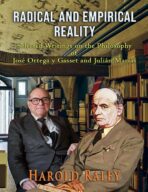The title is precise. The writings in this volume are selections, not an exhaustive bibliography, of my works on José Ortega y Gasset and Julián Marías. Although the entire corpus of my essays and lectures spans more than five decades, my interest in this philosophy, both its “radical” and “empirical” levels, began at an unforgettable moment in July of 1963 and continues undiminished today. And since Ortega taught that in order to understand anything human, we must tell a story, I shall tell a version of mine
Even though at times I point out obvious errors in the languages as they are currently structured, I realize that the rules of grammar and usage in English or any other living language are, or can be, subject to change. This may not be true of, say, ancient Sanskrit, but then we note that despite its perfection—or perhaps because of it—ancient Sanskrit ceased to be a spoken tongue many centuries ago. Over the ages thinkers have pondered the qualities that define humanity and set mankind apart from other species. In my view, no stronger case than language can be made for human uniqueness. Animals can communicate and mimic but they cannot speak. Language, sung, recited, or spoken, is archly human, and for that reason also deeply mysterious, beautiful, and fascinating.
 Updating...
Updating... 
